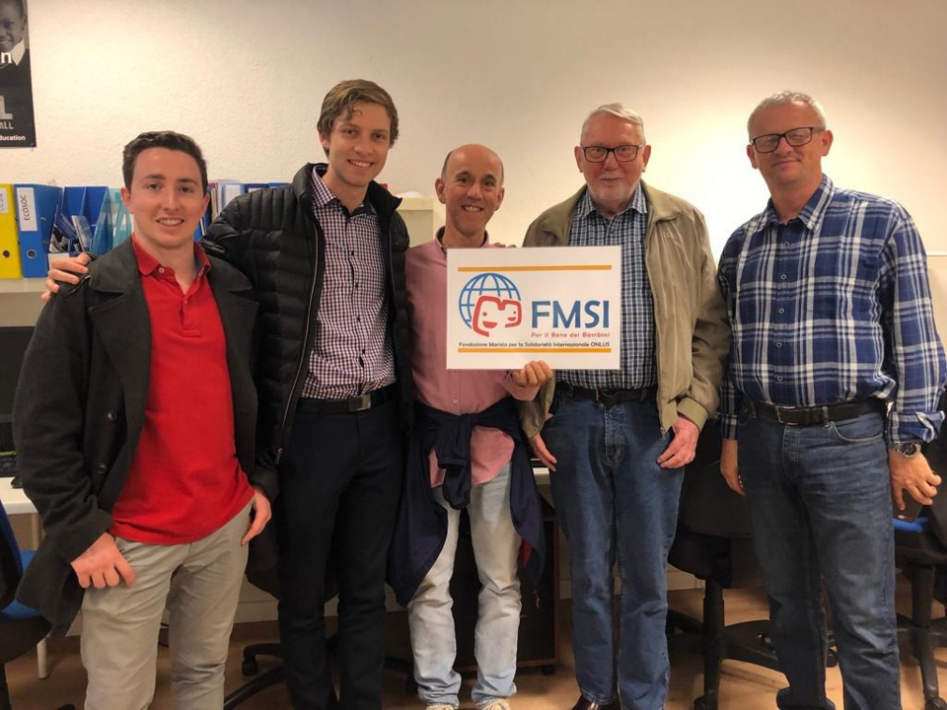
Universal Periodic Review: an UN tool for Marists to promote the human rights
To break-open and understand the system United Nations Universal Periodic Review (UPR) we find that the review of a Nation States record of Human Rights activity is not a linear process. Step 1 … Step 2 … Step 3 … end! It is more like a tapestry and NGOs such as FMSI need to weave themselves in and out of the process in collaboration with their Marist network partners located in the eighty countries that make up the twenty seven administrative units of the Marist Global Family. So, when you read this you need to be prepared to travel backwards and forwards through the various activities that form the whole canvas or picture.
The UPR is a unique process which involves a review of the human rights records of all UN Member States. Each Member State is reviewed in cycles with a four-and-half year period.
Who conducts the review?
The reviews are conducted by the UPR Working Group which consists of the 47 members of the Council. Each State review is assisted by groups of three States, known as a Troika, serving as rapporteurs.
What are the reviews based on?
The reviews are based three sets of documents presented by:
- A Nation State: information provided by the State under Review … a national report.
- United Nations bodies: information contained in the reports of independent human rights experts and groups, known as the Special Procedures, human rights treaty bodies, and other UN entities.
- Civil Society Organisations (CSO): information from other stakeholders including national human rights institutions and non-governmental organizations such as FMSI and its partners (principally Franciscans International and Edmund Rice International with whom we share an office in Geneva.)
The UPR is a process rather than a single event
It is often misunderstood that the public session
of the UPR Working Group on the State under Review, which is scheduled
towards the end of the process, is the actual UPR.
This meeting is known as an Interactive Dialogue, and is a time when all
Nation States can offer statements and make recommendations to the State under
Review. The State under Review is obliged, by a resolution of the Human Rights
Council, to respond to these recommendations. They can only support or note the
recommendations, they may NOT reject them, and they must respond to each
recommendation clearly in their addendum which is submitted to the Human Rights
Council before the Human Rights Council adopts a final report.
Civil Society Organisations are encouraged to monitor but are notpermitted to speak at the Interactive Dialogue (only Nation States).
CSOs must endeavour to have the voice of their communities heard (advocacy) by Nation States and UN bodies beforehand so that their recommendations may be included in the formal dialogue and thus generate the legal need for the State under Review to respond.
What follows the Interactive Dialogue?
- The State under Review is given the chance to respond to some of the concerns raised.
- A report on the UPR Working Group session of the State under Review is adopted a couple of days after the review.
How does FMSI participate in this ministry of advocacy?
FMSI, which has consultative status at the UN, and other stakeholders (individually or in partnership) can influence the recommendations made to the State under Review through their engagement in several activities.
Before the Interactive Dialogue
- Making Individual or Joint Submissions to the UPR Working Group. These submissions may also be included by the Office of the High Commissioner for Human Rights (OHCHR) in its Stakeholder Summary, which is made available to the Member States of the UN. [Timeframe: 7 months before Interactive Dialogue].
FMSI relies on a network of ground-based Marists to provide research information on human rights issues that are of concern to them so that the submissions can be written collaboratively. - Lobbying Member States by arranging meetings with delegates and members of their Permanent Missions requesting that they include some recommendations proposed by FMSI when they speak during the interactive dialogue and at other diplomatic meetings. [Timeframe: 1 month before Interactive Dialogue].
Lobbying is sometimes supported by the presence of representatives from the State under Review who are sponsored to be in Geneva or by virtual appearances. The country representative personally makes representations to Permanent Missions, accompanied by their sponsoring NGO. - Participating in the UPR-Info pre-session. UPR-Infois an NGO which collates and monitors submissions and recommendations of the UPR. Participation in this meeting allows FMSI to speak to their submission in front of an audience containing other NGO’s, and many delegates from Permanent Missions. [Timeframe: 3 months call; 1 month meeting before Interactive Dialogue].
Country representatives often participate in these meetings.
During and immediately after the Interactive Dialogue and the Responses
- Monitoring the comments and recommendations of the Nation States and the UPR Working Party checking to see how many FMSI recommendations had been included in their interventions.
- Scrutinising the responses (addendum) of the State under Review.
- Evaluating the first report of the UPR Working group.
- Participating in Side Meetings which evaluate and reinforce the recommendations.
The Final Report
After the first report is adopted, the State Under Review has several months to formulate its responses to all the recommendations made to it.
The final report of the Working Group and Addendum is then again debated and adopted by a consensus at a plenary session of the Human Rights Council. [Timeframe: several months].
FMSI and members of the Marist Network will then monitor, and feedback results and activities prompted by the UPR. [Timeframe: a 4 year process until the next UPR for that country].
Universal Periodic Review (UPR) – 37th Session 9 -12 November 2020
THE RIGHT TO SEEK ASYLUM – Unaccompanied Minors in Australia who are ‘Legacy Caseload’ Asylum Seekers LCAS
Document submitted by Foundation for Marist Solidarity, International
